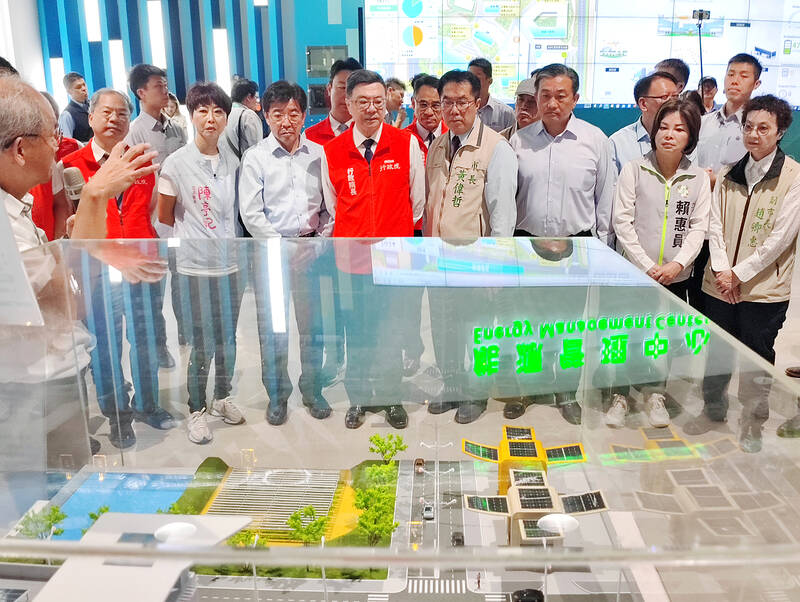A new artificial intelligence (AI) industrial park to be built in Tainan would be at the foundation of Taiwan’s development of AI as an industry and its application to other sectors, Premier Cho Jung-tai (卓榮泰) said on Saturday.
During a visit to Tainan, Cho toured the site of the Shalun Smart Green Energy Science City project and said the first two parts of the project that are built — the CyberSecurity and Smart Technology R&D Building, and the Shalun Green Energy Technology Demonstration Site — represent the starting point for the science city’s AI development.
The new AI park is to extend out from those two areas, he said.

Photo: Wu Chun-feng, Taipei Times
The National Science Technology Council one of the agencies overseeing the park, said it would house data centers, and other sections are planned for zero-carbon technologies, quantum science, smart agriculture, smart transportation and smart medicine.
Cho said the park was being established to carry out President William Lai’s (賴清德) policy of supporting “Five Trusted Industry Sectors” — semiconductors, AI, defense, security and surveillance, and next-generation communications.
Major tech companies such as Nvidia and AMD have plans to further their bases in Taiwan, and the government has the responsibility to provide good infrastructure to facilitate their investment, he said.
The industrial park would be another base connecting with northern Kaohsiung to form a “southern smart corridor,” he said.
Northern Kaohsiung is emerging as a site for high-tech parks, including the Northern Kaohsiung Industrial Park project that broke ground last year, and the Ciaotou Science Park aimed at attracting semiconductor, smart machinery, and space-related companies.
Also sprouting up is the Nanzih Technology Industrial Park, where Taiwan Semiconductor Manufacturing Co is building a fab that would produce advanced 2-nanometer wafers.
Council head Wu Cheng-wen (吳誠文) said his agency would accelerate the building of data centers and work with top international enterprises to turn Shalun into an AI R&D stronghold in the Asia-Pacific region.
Tainan Mayor Huang Wei-che (黃偉哲) said the AI park could benefit from the presence of AI research institutes at National Cheng Kung University and National Yang Ming Chiao Tung University’s Tainan Campus and would also eventually benefit other southern cities.

Taiwan is stepping up plans to create self-sufficient supply chains for combat drones and increase foreign orders from the US to counter China’s numerical superiority, a defense official said on Saturday. Commenting on condition of anonymity, the official said the nation’s armed forces are in agreement with US Admiral Samuel Paparo’s assessment that Taiwan’s military must be prepared to turn the nation’s waters into a “hellscape” for the Chinese People’s Liberation Army (PLA). Paparo, the commander of the US Indo-Pacific Command, reiterated the concept during a Congressional hearing in Washington on Wednesday. He first coined the term in a security conference last

Prosecutors today declined to say who was questioned regarding alleged forgery on petitions to recall Democratic Progressive Party (DPP) legislators, after Chinese-language media earlier reported that members of the Chinese Nationalist Party (KMT) Youth League were brought in for questioning. The Ministry of Justice Investigation Bureau confirmed that two people had been questioned, but did not disclose any further information about the ongoing investigation. KMT Youth League members Lee Hsiao-liang (李孝亮) and Liu Szu-yin (劉思吟) — who are leading the effort to recall DPP caucus chief executive Rosalia Wu (吳思瑤) and Legislator Wu Pei-yi (吳沛憶) — both posted on Facebook saying: “I

The Ministry of Economic Affairs has fined Taobao NT$1.2 million (US$36,912) for advertisements that exceed its approved business scope, requiring the Chinese e-commerce platform to make corrections in the first half of this year or its license may be revoked. Lawmakers have called for stricter enforcement of Chinese e-commerce platforms and measures to prevent China from laundering its goods through Taiwan in response to US President Donald Trump’s heavy tariffs on China. The Legislative Yuan’s Finance Committee met today to discuss policies to prevent China from dumping goods in Taiwan, inviting government agencies to report. Democratic Progressive Party Legislator Kuo Kuo-wen (郭國文) said

The Ministry of Economic Affairs has fined Taobao NT$1.2 million (US$36,900) for advertisements that exceeded its approved business scope and ordered the Chinese e-commerce platform to make corrections in the first half of this year or its license would be revoked. Lawmakers have called for stricter supervision of Chinese e-commerce platforms and more stringent measures to prevent China from laundering its goods through Taiwan as US President Donald Trump’s administration cracks down on origin laundering. The legislature’s Finance Committee yesterday met to discuss policies to prevent China from dumping goods in Taiwan, inviting government agencies to report on the matter. Democratic Progressive Party